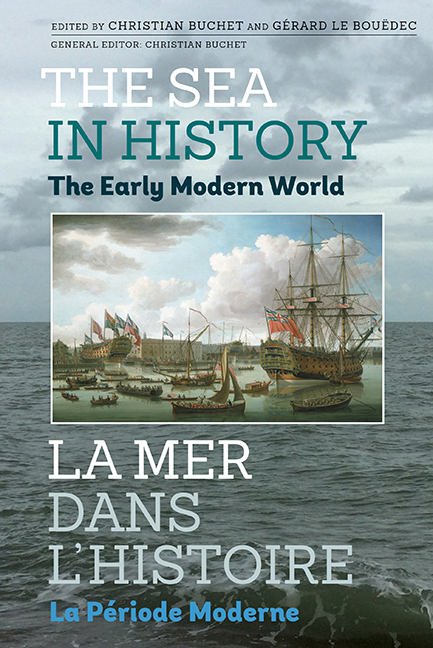Book contents
- Frontmatter
- Contents
- List of Illustrations
- List of Contributors
- Introduction générale et remerciements par
- General introduction and acknowledgements
- Introduction (français)
- Introduction (English)
- LA RÉUSSITE PAR LA MER:La reussite par la mer des territoires et des communautés littorales
- La construction d'un espace mondial: La circulation maritime et les ports
- La forte croissance de l'économie des pêches et des échanges
- Les acteurs de la dynamique maritime
- LA PUISSANCE MARITIME INSTRUMENT DE LA PUISSANCE POLITIQUE ET D'UNE STRATÉGIE GLOBALE DE RAYONNEMENT VOIRE DE DOMINATION: Les puissances maritimes occidentales
- L'ordre des Hospitaliers de Saint-Jean de Jérusalem, Rhodes et Malte, puissance maritime
- Portugal, the west seafront of Europe
- Les formes complexes de la prédominance de l'Espagne, première puissance mondiale de l'histoire
- Le maritime, fondement de la prédominance commerciale et économique des Provinces-Unies
- The keys to British success: trade as a motor and sea as a centre
- Le modèle français: la recherche par l'état de la prédominance maritime, réussites et échecs
- L'Europe Centrale et la mer à l'époque moderne
- Swedish and Danish rivalry to become great powers seen through the development of naval and merchant fleets
- Ambiguous relations between Russia and the sea: causes and consequences
- L'océan Indien, entre convoitises et indifférences
- Les puissances maritimes asiatiques
- L'Afrique
- La politique maritime et l'idéologie
- Mer et développement technologique
- Développement maritime et maîtrise économique et financière
- Développement maritime et maîtrise organisationnelle
- Conclusion (français)
- Conclusion (English)
- Conclusion générale par
- General conclusion by
- Miscellaneous Endmatter
- Miscellaneous Endmatter
The keys to British success: trade as a motor and sea as a centre
from LA PUISSANCE MARITIME INSTRUMENT DE LA PUISSANCE POLITIQUE ET D'UNE STRATÉGIE GLOBALE DE RAYONNEMENT VOIRE DE DOMINATION: Les puissances maritimes occidentales
Published online by Cambridge University Press: 11 May 2017
- Frontmatter
- Contents
- List of Illustrations
- List of Contributors
- Introduction générale et remerciements par
- General introduction and acknowledgements
- Introduction (français)
- Introduction (English)
- LA RÉUSSITE PAR LA MER:La reussite par la mer des territoires et des communautés littorales
- La construction d'un espace mondial: La circulation maritime et les ports
- La forte croissance de l'économie des pêches et des échanges
- Les acteurs de la dynamique maritime
- LA PUISSANCE MARITIME INSTRUMENT DE LA PUISSANCE POLITIQUE ET D'UNE STRATÉGIE GLOBALE DE RAYONNEMENT VOIRE DE DOMINATION: Les puissances maritimes occidentales
- L'ordre des Hospitaliers de Saint-Jean de Jérusalem, Rhodes et Malte, puissance maritime
- Portugal, the west seafront of Europe
- Les formes complexes de la prédominance de l'Espagne, première puissance mondiale de l'histoire
- Le maritime, fondement de la prédominance commerciale et économique des Provinces-Unies
- The keys to British success: trade as a motor and sea as a centre
- Le modèle français: la recherche par l'état de la prédominance maritime, réussites et échecs
- L'Europe Centrale et la mer à l'époque moderne
- Swedish and Danish rivalry to become great powers seen through the development of naval and merchant fleets
- Ambiguous relations between Russia and the sea: causes and consequences
- L'océan Indien, entre convoitises et indifférences
- Les puissances maritimes asiatiques
- L'Afrique
- La politique maritime et l'idéologie
- Mer et développement technologique
- Développement maritime et maîtrise économique et financière
- Développement maritime et maîtrise organisationnelle
- Conclusion (français)
- Conclusion (English)
- Conclusion générale par
- General conclusion by
- Miscellaneous Endmatter
- Miscellaneous Endmatter
Summary
ABSTRACT. The author shows how Great Britain owed its rise in power to its naval predominance, followed by its commercial predominance that culminated in the 19th century. The importance of its colonial empire, much more important than that of its rivals in the mid-19th century, resulted from this naval predominance. By allowing a large number of necessary raw materials to be obtained at the best price, this became a key driver of the strong economic transformation.
RÉSUMÉ. L'auteur montre combien c'est à sa prédominance navale que la Grande-Bretagne doit sa montée en puissance puis, bientôt, sa prédominance au plan commercial qui culminera au XIXe siècle. L'importance de son empire colonial, de beaucoup plus conséquent que ceux de ses rivaux au milieu du XIXe siècle, découle de cette prédominance navale. En permettant d'obtenir au meilleur coût et en grande quantité les matières premières nécessaires, il sera à son tour un principal moteur de forte transformation économique.
Any comparison of the total area of the world with the size of Great Britain, its major economic power in the 18th and 19th centuries, provides a rather stark contrast. Of the surface area of the world 70% is ocean and only 30% is land. The most economically developed continent of the time, Europe, accounted for less than 7% of the world's land area, and Great Britain, its richest nation, accounted for 0.0014% of the world's land area. Even if one allows for the importance of British colonies in 1880, it is striking that so small an area of land (0.130%) could have achieved world domination for over two centuries.
There is some debate among economists about the optimum size of countries and also the optimum size distribution of countries required to promote economic development. Arguments, based on the success of the European continent in achieving economic growth and development, claim that a system of relatively small nations, in competition with each other, can provide the best condition for economic success, given that this may possibly provide more homogeneity of the population's tastes and beliefs and a greater extent of political agreement.
- Type
- Chapter
- Information
- The Sea in History - The Early Modern World , pp. 466 - 474Publisher: Boydell & BrewerPrint publication year: 2017



